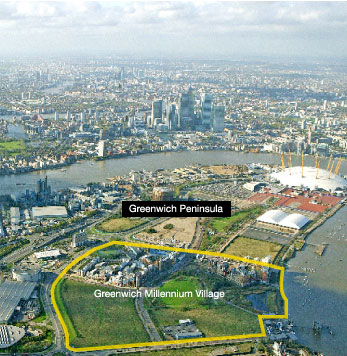252: Psyche of Property Investor versus Employee
02-08-2009
PropertyInvesting.net team
Employee versus Property Investor: This Special Report is dedicated to all those Employees and Property  Investors that wish to gain insights into the difference between the two working "species". Many property investors are employees - who started investing because they wanted to get out of the "Rat Race". Many have succeeded - others plan to do so in the next few years. Some would prefer to stay an employee because they love their work and like meeting people at work. But many employees of both private and public sector institutions aim to leave and "go it alone" - to take control of their time, freedom and financial destiny.
Investors that wish to gain insights into the difference between the two working "species". Many property investors are employees - who started investing because they wanted to get out of the "Rat Race". Many have succeeded - others plan to do so in the next few years. Some would prefer to stay an employee because they love their work and like meeting people at work. But many employees of both private and public sector institutions aim to leave and "go it alone" - to take control of their time, freedom and financial destiny.
Remember the Background: Remember back to the stock market crashes of March 2000 the end 2011. Pensions went up in smoke. Stock equity was wiped outt. Many people took control an started property investment portfolios. Most succeeded in making serious money for the first time in their lives. Many became successful full time property investors.
 The stock market crashed again in October 2008 - 40% of the value of most shares was wiped out in a few months. Okay, property prices in the UK came down 15% in 2008 (after rising 250% in ten years prior to early 2008).
The stock market crashed again in October 2008 - 40% of the value of most shares was wiped out in a few months. Okay, property prices in the UK came down 15% in 2008 (after rising 250% in ten years prior to early 2008).
Huge property investing opportunities abound in both an up and a down market. The London Olympics is only 3 1/2 years away. Major infra-structure investments and regeneration will transform many parts of London and the UK - it's still very exciting today - as it has been in the last ten years.
Insights into the Psyche of Property Investors: What we have done below is compare some common view that a classic property investor would have, versus an employee who has not interest in property investing, or any other investment for that matter. They are end members - but the analysis is meant to stimulate you thought processes as to whether you have more of the mindset of a property investor or an employee.
If you always tink like a classic property investor, but are actually an employee, you will likely be a very frustrated individual. This analysis will help you understand why you are so frustrated at work!
Property Investor
Company Employee or Public Sector Employee
Knows when to cut and run
Loyal, holds on, saves face
Dominant character - likes to lead and control - takes full responsibility
Likes to work in community of workers with shared responsibility
Take full accountability
Prefers shared accountability
Autocratic decision maker
Decision by committee
Directs attention towards individual value creation
Directs attention towards process, systems and how value can be created for the community or business
Family oriented - makes money for him/herself and immediate family
Family oriented - strives for security, perks, pension, ability to feed family and pay bills
Invests in building business and investing in private enterprises
Invests in savings, pension and time within community
Aims to make serious money, then have options to give large sums to charity
Gives small amounts on continuous basis to charities
Self confident
Feels more confident within teams and within an institution
Hates bureaucracy and red tape
Likes bureaucracy that can justify their job
Money and assets is status
Job position, title, wage and office is status
Impatient - strives to make money quickly
Patient - working for long term pension
Likes working from home and out and about
Likes commuting to office to meet other people
Likes to control their time and agenda - freedom
Does not mind other people controlling their time and agendas
Financially literate - likes to leverage cash to use other peoples money to create cashflow and increase their individual asset values
Not financially literate - thinks investing is saving money and putting money into a pension
Always looking for tax breaks and offset - pays low tax
Pays high tax via PAYE - does not looks to reduce tax bill
Lives in huge house and fast car (or second hand car)
Lives in medium sized house with medium sized new company car
Never makes excuses - views lost money as a learning event that improves chances of making serious money
Makes excused for not making money from so called "investments"
Wants to retire young
Plans to retire at normal retirement age, whatever the government or company deems this to be
Does not have a boss - is the boss
Does what the boss says he/she should do
Likes to be the boss
Is scared to be the boss - too much responsibility
Hates conformity - hates standards and procedures - only follows them to reduce business risk, fallow law and make money
Likes to conform to standards and procedures
Very creative - individually
Not comfortable with creativity - likes to come up with ideas within groups
Strong personal opinions
Likes to seek combined team view and opinion
Can be very private or very flambuoyant
Family man/woman - likes to share family stories
Not scared to cut losses
Hangs on if a loss is made to save face
Values financial savvy, financial literacy, deal making skills
Values education, training, professional qualitifications
Likes to challenge norms
Happy with status quo
Loyal to family
Loyal to family and work
Wants to make money quickly and move money around
Likes to keep money in one place - scared to move money around
Sees inflation as an opportunity to increase the value of leveraged assets
Sees inflation as a threat to savings scheme and pension
Values pension at zero in assets and liabilities statement
Does not know what an assets and liabilities statement is - but thinks a pension has some value
View making money as a discipline - much like a professional would
View making money as a discipline - much like a professional would
Thinks about money constantly - and likes talking about money - is proud of money making achievements
Never thinks about making money - only getting wage and paying bills. Views talking about making money as "rather distasteful" and not appropriate in social groups
Admires people who have more money than themselves - and says so in social circles
Is jealous of people would have more money than themselves - makes excuses and criticizes them
Money = class (does not mind what social class a person comes from or what accent they have)
Professional qualifications, job and social background and up-bringing = class
Friends are investors and people interested in business
Friends are colleagues at work
One big difference between an employee and a property investor is the amount of tax paid. It's a massive difference. If you can make the break from an employee to a property investor you'll likely see you tax bill reduced from a total of ca. 65% to about 35%!
Employee – penalty : Just in case it escaped your notice, Chancellor Darling again massively increased the tax take of the wealthy employee at his Pre-Budget Speech. In 2011, anyone earning over £150,000  will be taxed at an income tax rate of 45%. Interpreting this – it also implies all bonuses and stock options will be taxed at this increased rate – up from 40% to 45%. National insurance will also rise by another 0.5%. By 2011, many people in
will be taxed at an income tax rate of 45%. Interpreting this – it also implies all bonuses and stock options will be taxed at this increased rate – up from 40% to 45%. National insurance will also rise by another 0.5%. By 2011, many people in
Self Employed Investor - benefits: So now let’s compare this with a self employed property investor. Recently, capital gains tax was reduced from 40% to 18%! VAT was reduced from 17.5% to 15%. VAT is exempt from any property that is a renovation above shops in an empty property. You can offset all your earnings against expenses. So you should be able to stay well beneath the 40% or 45% income tax bracket. Stamp duty is exempt from any property costing less than £150,000. You can also ro ll properties into a REIT. Clearly – your tax bills have drastically dropped in the last few years thank goodness. Though this of cause has not been enough to prevent house prices drops – hardly surprising as the average employee has been squeezed so hard, they cannot pay high property prices any longer. Meanwhile, first time buyers have disappeared almost completely.
ll properties into a REIT. Clearly – your tax bills have drastically dropped in the last few years thank goodness. Though this of cause has not been enough to prevent house prices drops – hardly surprising as the average employee has been squeezed so hard, they cannot pay high property prices any longer. Meanwhile, first time buyers have disappeared almost completely.
Dont Get Any Bright Ideas: But just in case the government gets any bright ideas about increasing the tax burden on property investors, it is only because buy-to-let investors are bottom feeding at present that there is not further property price falls. Meanwhile the government is providing ever decreasing social housing – meaning private landlords – with government regulations – have stepped in to make up the shortfall in rental property provision. And if buy-to-let investors go under, this will have a huge negative impact on tenants and the general state of the housing market. Furthermore, it is almost impossible to get borro

wing at present, particularly if you are a self employed property investor – and do not have any secure long term earned income from being an employee. Property investors who do not have jobs are struggling as banks refuse them lending. So please, no bright ideas to cream any further tax from property investors – it will only end in tiers.
The actual point we are making is – it sucks being an employee since the tax burden is MASSIVE. Meanwhile, through starvation of funding, it’s very difficult for self employed property investors to survive unless that have a huge cash generating stable property investment portfolio. Banks view the self employed as high risk – particularly at present with property prices dropping.
 But when the property market eventually improves and prices start rising again, then self employed property investors should benefit from more available funding, capital gains tax of 18% and the ability to reduce earned income to a minimum by offsetting against expenses – and reinvesting income into their property portfolios – to seek 18% capital gains tax consideration.
But when the property market eventually improves and prices start rising again, then self employed property investors should benefit from more available funding, capital gains tax of 18% and the ability to reduce earned income to a minimum by offsetting against expenses – and reinvesting income into their property portfolios – to seek 18% capital gains tax consideration.
Massive Petrol Prices: A comment on petrol prices. When you buy a litre of petrol in the
Again, the point is – if you can break out of being an employee there are massive benefits. But you need to make sure you have a robust business and property portfolio before doing so. Don’t leave work then find you cannot get any borrowing from banks – otherwise you’ll be rapidly going back again with “your tail between your legs”! And you wont be getting any help with healthcare, company car, pension etc – for what they may (or may not) be worth.
We hope these insights have helped frame for you the difference between the psyche of a property investor verses employee.
Happy investing - and good luck with the ealy retirement and financial freedom!
Padstow - Cornwall - with Rich Stein's seafoord restaurants in middle-left of photo (an amaizing semi-retirement spot for property investors along with Rock over the Camel estuary - mixed with visits to London and the rest of UK - to develop the property portfolio)


